- Home
- Barbara Kingsolver
Flight Behavior Page 16
Flight Behavior Read online
Page 16
"And then I guess you come to this one," Dellarobia said, presuming this was the answer. "Is that so bad? They're beautiful. We don't get a lot of bonuses around here, let me tell you."
Pete exchanged a look with Bonnie and Mako. Their silence embarrassed her.
"They are beautiful," Ovid said evenly. "Terrible things can have beauty."
"What's the terrible part?"
He shook his head slowly, exactly the same gesture she'd seen that first night when Cub struck up the conversation by asking what he made of their butterfly situation. "Terrible, beautiful, it's not our call," Ovid said. "We are scientists. Our job here is only to describe what exists. But we are also human. We like these butterflies, you know?"
"Of course," Dellarobia said. Good to know, being human was allowed.
"So we're very concerned," he said. "Monarchs have wintered in Mexico since they originated as a species, as nearly as we can tell. We don't know exactly how long that is, but it is many thousands of years. And this year, instead of the norm, something has put them here."
He took a bite of his sandwich, which appeared to be cream cheese on wheat bread, while she chewed on "thousands of years." In her experience, conversations of this nature always ended with the same line: The Lord moves in mysterious ways.
What he said instead knocked the wind out of her. "If you woke up one morning, Dellarobia, and one of your eyes had moved to the side of your head, how would you feel about that?"
"Unh." The repellent image filled her mind for a half second, before she could ward it off. "I'd scream," she said. "I'm scrinchy about eyes, to begin with."
"Well, that is about the sum of it. Your eye might look very pretty over there beside your ear. But what we see here worries us. We are scrinchy, as you say."
All four of them looked at her with such grave expectation, she felt as if her face really might have become rearranged. She couldn't guess if Ovid was pulling her leg. A relocated eyeball. Were they serious? "Well, I guess I'd call the eye doctor," she said. "I despise going. That's about what it would take to get me there."
She ate the lunch she had carried here in a plastic grocery bag because she didn't have a nice little expensive backpack. She didn't have a nice little college education, either. She'd just have to let the smart people figure this one out. She tried to hold on to anger but felt it being swamped by a great sadness that was rising in her like the groundwater in her yard. Why did the one rare, spectacular thing in her life have to be a sickness of nature? These butterflies had been hers. She found them, she'd showed them to her son, in her name they were becoming beloved and important. They seemed to matter, like nothing she'd ever possessed. Already she had made up her mind to throw her one hundred dinky pounds against the heft of her family's men, if it came to that. So how did an outsider just get to come in here and declare the whole event a giant mistake? These people had everything. Education, good looks, boots whose price tag equaled her husband's last paycheck. Now the butterflies were theirs too.
She worked steadily through the afternoon counting insects. She'd had worse jobs in her life. One quadrat she split with Mako, and all the ones still uncounted she did by herself while the rest of the crew did other work. They measured trees by looking at them through a little yellow instrument, and measured wingspans using tweezer things called calipers, and measured what they called wet weights using tiny scales that looked like drug-dealer equipment to Dellarobia, not that she knew. When the light began to wane they headed down-mountain. She was ready to bolt and run toward the sight of her dear children and, more importantly, her cigarettes. But they all walked together, climbing back up through the forest to the High Road and descending it with the sun at their backs. Butterflies that had moved around during the day now flowed toward them up the road, coming home to roost. They'd been out seeking flowers if they could find any here, for nectar, Ovid said. Warm days that got them awake and flying around would deplete their fat reserves. Fat reserves, on a butterfly? Yes. In fact, he said, warm spells might be a bigger danger here than the cold snaps. The butterflies would burn through their fuel much more quickly than in the steady cool of Mexico's high-altitude roost. That was a big problem on this mountain, with no winter flowers for refueling. She tried to picture winter flowers, and came up blank. Poinsettias? Depauperate of nectar sources, was what he said. She tried not to take it personally that her mountain was poor in all ways, even flower-wise.
She tried to calm her burgeoning resentments and just float on the tide of butterflies that surrounded them. It was like being inside a video game. Little V shapes of moving orange light kept coming at her, sweeping around. They seemed to magnify the sunlight, igniting the air. She could see how they would need steady cues in their unsteady world. She felt for them. She wanted to like the scientists too, who really did care about the butterflies, probably a far cry more than she did. It was true what Ovid said, they were only taking the measure of things. If the news was bad, that wasn't their fault. They were just people. Kids, for the most part, basically her own generation, with jackets tied around their waists, walking along in a river of butterflies.
Earlier in the day she'd taken a look at Mako's coat with its wrecked zipper, and had considered offering to replace it, but hesitated. Maybe he didn't care one way or the other. She made the offer now.
"Replace it? You mean, take out the zipper and put in a new one?" he asked her, apparently unacquainted with the concept of clothing repair. These kids must think their expensive gear grew on trees.
She laughed. "Lay that coat out on a table and use some of those measuring tools you've got to measure the zipper. You can buy one just like it at the Walmart in Cleary, they've got fabric and notions. Bring it to the house tomorrow, if you can get by without your coat for a day, and I'll fix you right up."
"You've got, what, like a sewing machine?" His surprise was genuine.
"Well, yeah," she said, "a sewing machine. It's not like an atom-smasher or anything. Just a needle that goes up and down. I used to make just about everything I wore, in high school. Prom dress, the works. It was the alternative to fashion death, in my income bracket."
"But how did you learn to do that?" Bonnie also seemed floored. All these college graduates, mystified by Dellarobia's store of knowledge. She wasn't sure whether to feel proud or mocked.
"It's nothing all that hard, it just takes patience. My mother was a seamstress."
"Really," Mako said. "Like, what would she sew?"
"Her specialty was business suits, if you can imagine. Mostly for women, but some older men still had their suits made to order, when I was little. Before they all went over to buying factory made at half the price."
"In some sweatshop," Bonnie said.
"Or foreign-made at one-tenth the price, right," she agreed. "Mama brought me up to be really picky about double seams and linings, and then set me loose in a world where those things don't even exist."
The students seemed to be digesting this. Maybe they didn't know about seams and linings either. Mako changed the subject, remarking that the washed-out road would hinder her mother's tourism business. It took her a second to realize he meant Hester.
"Oh. That's not my mama. My mother-in-law." She decided not to mention her dead parents, a reliable conversation-stopper.
"Who does she bring up here?" Mako wanted to know. The others were listening too, she could tell, surprisingly curious about these personal things. She was not the only one with questions she was afraid to ask. For the first time all day, it dawned on her that these scientists owned nothing here, and knew it. Her husband's family could kick them out and tear down the trees and the butterflies uncounted, at the snap of a finger. There were two worlds here, behaving as if their own was all that mattered. With such reluctance to converse, one with the other. Practically without a common language.
"Well, it was all church groups to begin with," she said. "This has been a meaningful thing in our church, people appreciate . . ." She hesitat
ed to use churchy words. "The beauty, I guess. It's inspiring for people to see. It helps them respect the earth."
The forest went still under golden evening light that made everything look precious. Even the roar of the water seemed to quiet. "How big is your church?" Bonnie asked, after a bit.
"Over three hundred people," she said, a figure that raised their eyebrows. She wondered what sort of church college students attended, if any. "And it's not just our congregation. First it was just kind of locally famous, but people are starting to come from Cleary and places farther away. Now that it's been in the paper twice." The second time, when a reporter and photographer came, they'd claimed they were there to interview the science team, but it hadn't gone that way.
"Hester keeps the touring pretty well organized. She doesn't like the groups to be more than eight or ten at a time. And if people are, you know, old or something, disabled, or little children, she brings them on the ATV. She charges more for that."
"So no senior discount," Mako observed.
"Nope. My mother-in-law is not one for making allowances. If she were an undertaker, she'd tell her clients to quit whining and walk to the cemetery."
They had a laugh at Hester's expense, and Dellarobia felt a twinge, wondering where her loyalties ought to lie. Certainly she had not planned to fall into any alliance with these students. But she would miss their interesting energy when they were gone. They were all headed home for Christmas, wherever home was, the following week on the twenty-first. The shortest day of the year, according to Johnny Midgeon on the radio, her main educational source. Bonnie and Mako would not be coming back with Ovid after the break, because they were only second-year graduate students and had classes to attend. Ovid taught classes just for the first semester and the rest of the year did his research. He'd recently received something called a genius grant, Bonnie explained, implying this made him a VIP. Dellarobia had heard of stars with their own trailers, but not the type where the toilet and shower did double duty. Pete also might come back, Bonnie said, because he was a postdoc doing research full-time, but he wouldn't stay long because he had to be on campus to run Ovid Byron's lab. Dellarobia thought of mad-scientist labs in the movies, bottles of things boiling over, and despaired at the gulf between her brain and all there was to know. The words "butterfly lab" made no sense.
When they'd dropped back a little way behind the men on the trail, Bonnie also mentioned that Pete was a newlywed. His wife didn't like him gone too long. Dellarobia pointed her chin at the well-muscled shoulders of Pete, and asked, "Would you?"
Bonnie laughed. "I guess not." Dellarobia thought to ask Bonnie if she was also married. She said she wasn't.
If Hester could look past her nose, she would see these kids were not stuck up. Worldly maybe, and heedless of their good fortune, to be sure. But in some ways they seemed young for their age. Dellarobia wished she could do something for them, other than zippers and laundry. And the dilly beans she'd brought them that once, which they'd gone crazy over, practically licking out the jar as if she'd put narcotics in there with the dill and vinegar. She could certainly bring over some more from Hester's, as they'd canned about fifty quarts. How could a person never have heard of dilly beans?
A going-away party, she thought now. Just a little gathering in her living room, Christmas cookies and eggnog. She almost brought it up to Bonnie, but her nerve failed. They were near the end of the trail, the opportunity would pass; she formed the words but found she could not say them. She was embarrassed to invite these people into her house, that was the long and short of it. A man living in a motor vehicle, the others maybe rooming next to a meth lab, but still Dellarobia couldn't bear how they would see her life. Like the country-music diner they called "vile." If these kids didn't know a zipper could be replaced, they had surely not seen the likes of her Corelle plates and stained carpet and pillow-strewn rooms. Her every possession was either unbreakable, or broken.
7
Global Exchange
Every disaster proved useful for someone, it seemed, and flooding was good for the gravel business. Cub was called in to work double shifts through the weekend and into the following week, even missing church, which Hester felt was justifiable for those involved in emergency services. In Cub's case that mostly meant delivering gravel to people whose driveways had relocated onto their downhill neighbors. But it also meant money, which brought no complaints. Dellarobia and Cub would catch up their house payments by year's end, and everything else would go to the equipment loan, including Hester's tour group proceeds. They'd been calling this her "butterfly money," an apt name for such a lightweight source of funds. The impending loan payment was a balloon, and that name was not apt, for something that weighed enough to crush a family. Bear and the Money Tree men struck an agreement to wait a month for things to dry out, two months at the most, before they went ahead with the logging.
Dellarobia had hardly seen Cub since Hester's surprising visit. She intended to mention it, but that afternoon he'd taken the monthly run to the landfill with their trash, and early the next morning she'd hiked up the mountain with Ovid and the students. When she came back, Cub was called in to work to drive gravel to a road washout, the first of many. Now she basically handed him his coffee as he went out the door. This morning she'd wondered where all their mugs had gotten to, and realized they must be rolling around empty on the floor of his truck. His shift ended at four today, and she'd asked Dovey to babysit so Cub could come with her to do some shopping for the kids. Dovey thought they should drive over to Cleary, which had fifty times more stores, at least to window-shop, but Dellarobia couldn't afford to walk into most of those places, and recreational envy was not her idea of fun. Maybe the Walmart on this end of Cleary's outskirts. But they ended up getting a late start, so they would just have to scavenge the subpar storefronts of Feathertown. Cub wasted a full hour putting up a whine. He was tired. A Virginia Tech game was on. Amazing, how men who had no use for college could summon such enthusiasm for college ball. "Why don't you just go with the kids?" he'd asked. "You always do that, put Cordie in the shopping cart and go."
"Christmas shopping? As in, Surprise, kids, Santa came?"
She hadn't yet bought one present. A resentment of the Christmas season was fair game, she felt, for people who've lost their parents, have no expendable income, or both. The cedar still stood naked in their living room exuding its prickly scent, as barren of Christmas spirit as the muddy outdoor landscape. She'd asked Cub to mention to Hester they were doing Christmas morning at home this year. And maybe suggest she donate some set decoration for the affair. But she didn't know how that was going, as she hadn't really conversed with her husband in days.
Naturally, given an opportunity at last, she jumped in with both feet and they fell to arguing immediately. It was a rule of marriage: the more desperately you needed alone time with your spouse, the quicker you'd spoil it with a blowout. When they went out to a restaurant without kids for their anniversary a while back, they'd ended up yelling in the car, actually cracking the rear window with a pair of channel locks (hurled in anger but not actually at anyone), over why he'd left his greasy channel locks in the car, among other topics. Today's acrimony was less athletic; they were too worn-out now for the major leagues. It was more of an endurance event, dragged through several errands across the four-block span of Feathertown: first the gas station, where she only let him fill the tank halfway so she could buy a carton of cigarettes for a price that nearly brought her to tears, swearing she'd make them last out the month, knowing she would not. Next, the discount hardware where they exchanged the fixture he'd picked up to replace their leaky kitchen faucet, because he'd gotten the wrong kind, as any idiot could plainly see. Now they hauled their dysfunctional date into the dollar store, where they hoped to provision their kids with a memorable holiday for something in the neighborhood of fifty dollars.
"I can't go against my dad on that logging," he said, for the twentieth time.
; "You can, but you won't," she said. Ditto.
"Because I'm not perfect like you want me to be." Ditto, ditto. They walked through the glass door and dropped it a few decibels, for decency's sake. "Show me where else you can get that kind of money from," Cub hissed, "and I'll take it to Dad."
The idea of that mountain dragged down, and a certain world with it, was becoming unthinkable to Dellarobia. Her life was unfolding into something larger by the day, like one of those rectangular gas-station maps that open out to the size of a windshield. She was involved in a way, with those scientists. And strangely, also, with Hester. She craved to tell Cub his mother wanted him to stand up against Bear, but she also longed for Cub to be his own man in this fight. A husband who was not just his mother's pawn but also the head of his household: was that too much to ask?
A four-foot-tall Santa figure near the store entrance began to grind his hips and emit a thin electronic rendition of "Joy to the World." It must have had some sensor inside that set the affair in motion when they walked near it. "Okay," she said, "let's focus. Christmas ornaments. Did you ask Hester about letting us have some of her stuff?"
"Here's your Christmas stuff," Cub said, waving at the aisles. Nobody could argue that one. The store contained enough plastic baubles to cover a hayfield.
"Great," she said. "Family heirlooms made by slave children in China." Her mother used to spit that one out like a curse: slave-children-in-China. Dellarobia was startled by the words she'd channeled, and that drab army of orphans she could still see in her mind's eye. She used to picture them in poorly made caps and jackets, resentful of happy homes everywhere, undercutting her father's handmade furniture business and her mother's work as a seamstress. Eventually those brats even shut down the knitwear factory where her mother had stooped from business suits to underwear, in the last decade of her employable life. In hindsight, Dellarobia could fathom her mother's drinking.

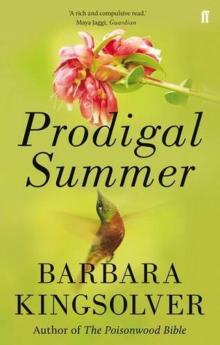 Prodigal Summer: A Novel
Prodigal Summer: A Novel Animal Dreams: A Novel
Animal Dreams: A Novel The Poisonwood Bible
The Poisonwood Bible High Tide in Tucson
High Tide in Tucson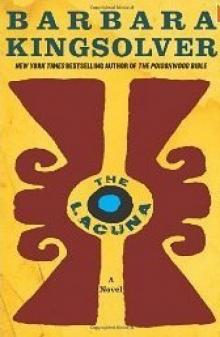 The Lacuna
The Lacuna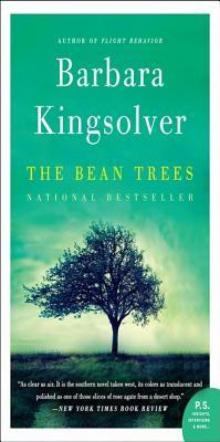 The Bean Trees
The Bean Trees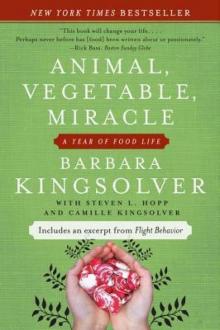 Animal, Vegetable, Miracle: A Year of Food Life
Animal, Vegetable, Miracle: A Year of Food Life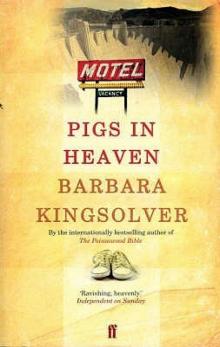 Pigs in Heaven
Pigs in Heaven Small Wonder
Small Wonder Flight Behavior
Flight Behavior Homeland and Other Stories
Homeland and Other Stories How to Fly (In Ten Thousand Easy Lessons)
How to Fly (In Ten Thousand Easy Lessons) Unsheltered
Unsheltered Animal Dreams
Animal Dreams Prodigal Summer
Prodigal Summer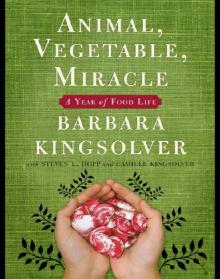 Animal, Vegetable, Miracle
Animal, Vegetable, Miracle